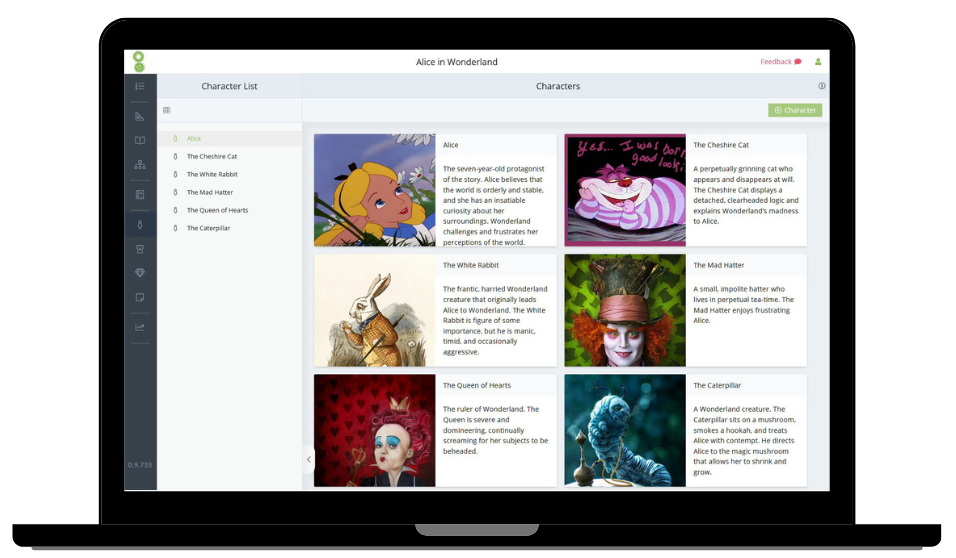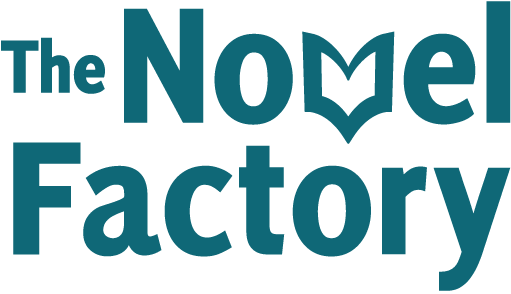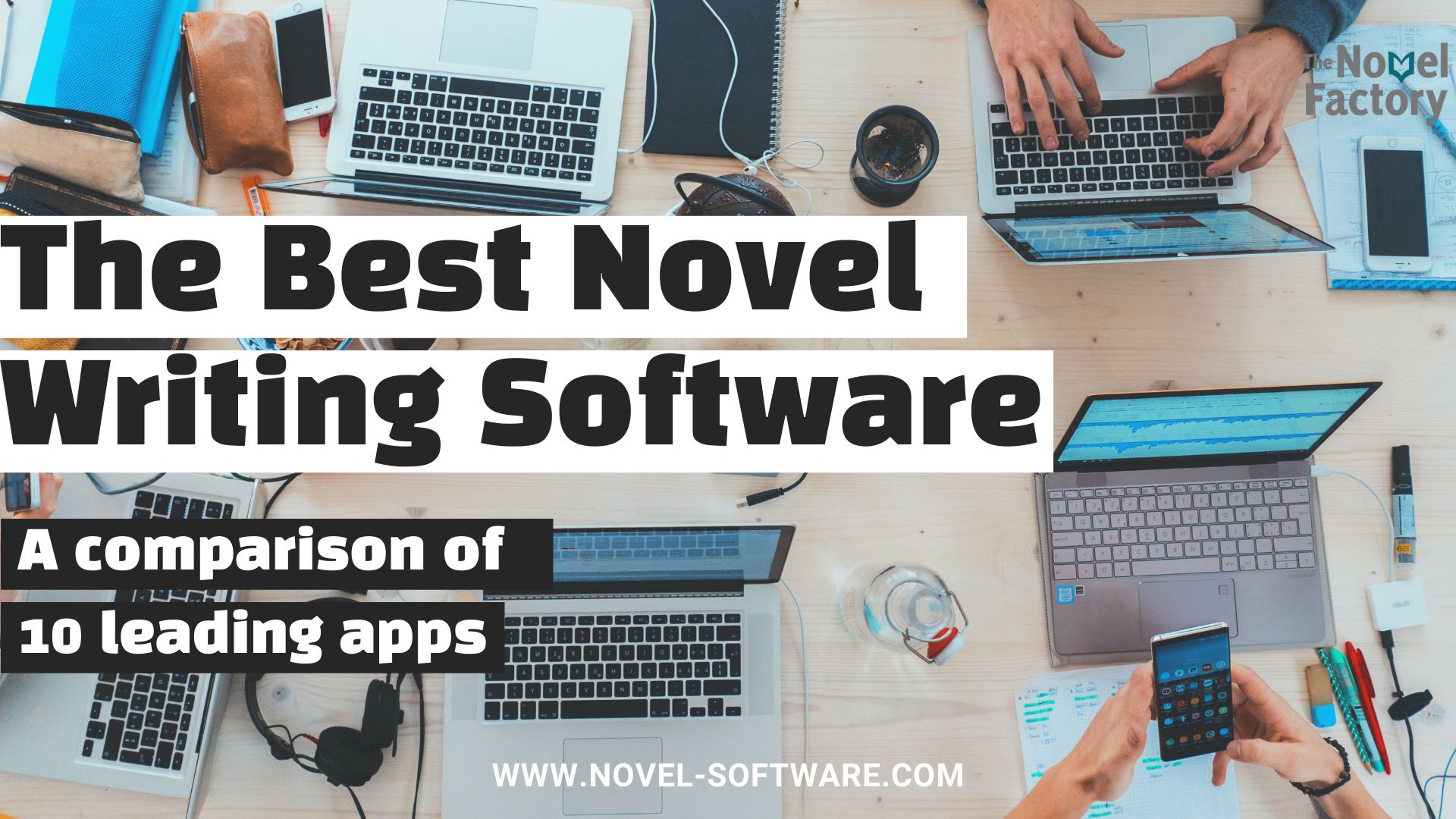
The Best Novel Writing Software in 2024: A Comparison of Ten of the Most Popular Apps
There are many ways to write a novel – and I’m not talking planners and pantsers right now.
I’m talking about how you get the actual novel from your head and onto a sheet of paper (even if that’s a digital sheet of paper).
Some people swear by old school pen and paper, writing everything out longhand.
Others insist that all you need is Word.
But increasingly, writers are turning to specialised tools to help them write novels more efficiently and effectively, and in most cases, that means novel writing software.
‘Novel writing software’ is a bit of a nebulous term, and there are many aspects of novel writing that software could help with, for example:
- Writing the actual manuscript
- Organising your notes
- Offering guidance on how to write a good novel
- Plotting and planning out the structure
- Keeping track of character information
- Editing and polishing a final draft
- Providing useful resources such as character questionnaires and plot templates
- Tracking goals and word counts
To achieve these goals, many writers use software that isn’t necessarily designed for novel writing.
For example, Word isn’t designed specifically for novel writing, any more than a sheet of paper is created for writing a novel on. It can be used for non-fiction, recipes, shopping lists, essays – anything with words.
Nonetheless, it meets the vast majority of the requirements of writing a novel.
Likewise, other authors use productivity software such as Trello or Evernote to keep track of various details of their novels, such as subplot details, sections that need re-editing, historical research etc.
But in this article, we’re going to focus on comparing ten of the top programs which are purpose built for novelists. Designed with novel writing in mind from day one. All the programs detailed below include a word processor, as this is a basic minimum for writing a novel. Most have some features to help with plotting. Many of them have dedicated features for character development, goal setting and word count tracking. A few of them even include integrated guides to writing your first novel.
We’ll look at the strengths and weaknesses of each, taking into account how writers’ needs differ and making suggestions as to which software might be best for your specific requirements as a writer, including: budget; approach to writing (do you prefer to do a lot of planning or very little); platform (PC, Mac or Web-Based); collaboration requirements (many writers work together on the same novel, or others may wish to share their manuscript with their editor); mental processing style (e.g. visual, freeform, very structured, how much aesthetics matters); and whether the writer is looking for novel writing craft assistance as well as databases and tools.
The 10 Best Novel Writing Software Apps
The Novel Factory
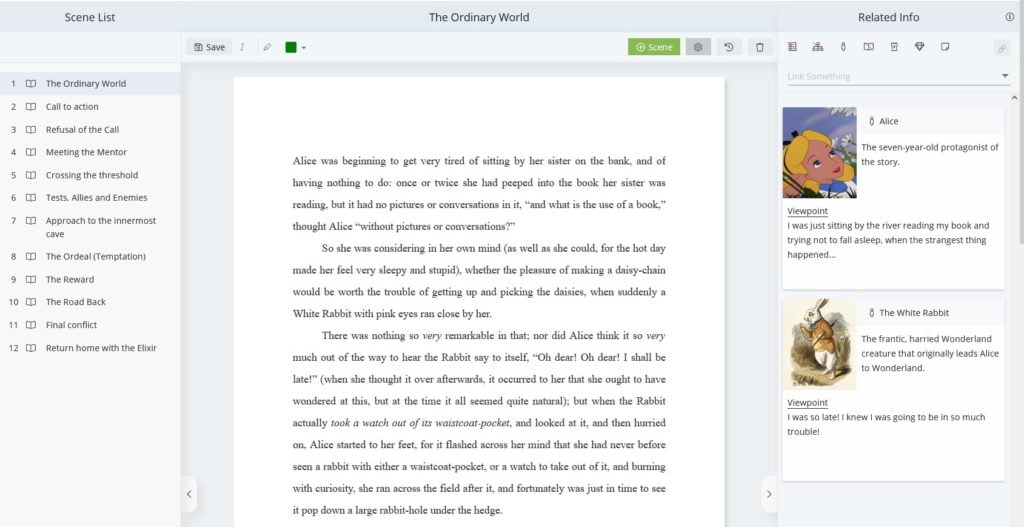
It will come as little surprise that we think the Novel Factory is the best writing software. That’s because we’ve spent the last ten years trying to work out what makes novel writing software great, and then building it.
Nonetheless, we are aware that writers’ needs vary, and that there are apps out there that are more established or have a different focus or a development team with different areas of expertise.
So we have genuinely done our best in this review to give an honest rundown of some of the best novel writing software options, analysing their strengths and weaknesses. But we’ll start with the one we know best.
The main strengths of Novel Factory are its intuitive, clean design and the wealth and detail of the novel writing resources.
As well as providing a word processor, features for creating plots and managing subplots, and areas for keeping notes on characters, locations and items – the software integrates what some have described as ‘an MA in writing’.
As well as the Roadmap, which is a step-by-step guide to writing a novel, it includes detailed character development questionnaires, world building guides and plot templates based on popular genres.
So it’s not just the car, but the engine and map as well.
The software has a section for setting your writing targets, and then automatically updates colour-coded graphs so you can track your progress towards them.
It also autosaves your manuscript and has version history, so you can access previous drafts of your writing.
And as the data is centrally stored, it’s easy for writers to collaborate on a single novel, always able to access the latest changes.
If we have to focus on the weaknesses of the Novel Factory, then we have to admit it’s not the cheapest option out there. Writers on a tight budget may not be able to stretch to $7.50 per month. We hate the idea of anyone being priced out, so we do run promos a few times a year which bring the price down, and we offer educational discounts and occasionally free licences on a hardship basis (get in touch with us for more info).
Is the Novel Factory the best novel writing software for me?
The Novel Factory is perfect for new writers, who want to learn their craft while writing their first novel.
It’s great for planners, who want to use established structures to make their story skeleton bullet-proof and develop complex characters with desires, flaws and internal conflicts.
It’s the right fit if you want somewhere to keep track of all supporting data, as well as writing the novel itself, and if you want options to work Online and Offline, as it suits you.
It’s good for visual learners, who appreciate being able to add a lot of images, who like to see how different aspects of the novel link together and who like everything clearly categorised and aesthetically appealing.
It’s less useful for writers who want something more freeform, or something where they can set up and rearrange the categories themselves. And discovery writers may prefer something a bit more streamlined and simple, as they may not need the additional sections for supporting data.
Click here to find out more about the features included in the Novel Factory 3.0, or click here for a free 30 day trial.
Scrivener
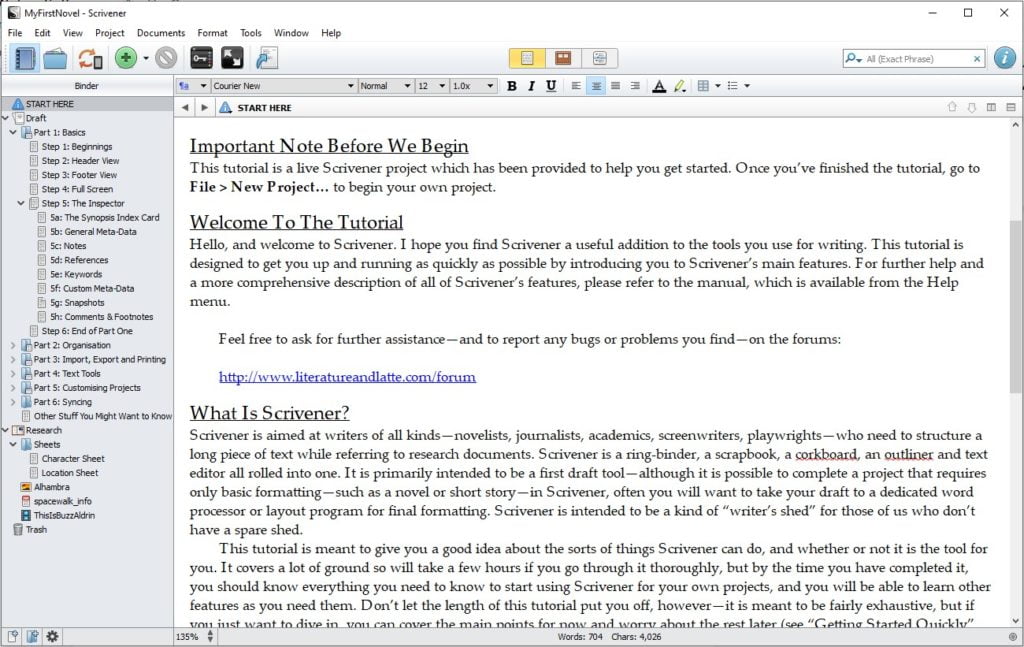
No novel writing software list would be complete without Scrivener – the Goliath of the writing software world.
Scrivener was one of the first apps to appear on the market, and is by far the most well-known program today.
The main strengths of Scrivener are its flexibility and richness of features. It has had a long time to mature, and take into account feedback from its huge community, so it is packed full of features, from index cards to name generators. It offers goal tracking, word counts and places to keep your notes.
Plus, because the community is so huge, you can take advantage of freely shared resources, such as character and plot templates.
Scrivener is very reasonably priced at £47, and is available for Mac, PC and even IOS (though the licences for each of these are sold separately), though there isn’t a web-based version.
The widely accepted main weakness of Scrivener is the other side of the coin of its strength – it’s complexity.
The ‘steep learning curve’ is cited by many as a real issue, and while there are dozens of courses to help you get to grips with the intricacies of the program, people who are trying to write a novel are usually already struggling to find enough time just to write their manuscript. And it’s quite a big ask to require someone to invest dozens of hours learning a program before they’re even sure it’s the right one for them.
Is Scrivener the best creative writing software for me?
Scrivener is a great app, with tons of fantastic features, and there’s a reason it’s used by so many writers.
As they state on their website, they, ‘won’t tell you how to write’, so this it’s best suited to an experienced novelist who has time to learn the features and work out how to use them to plan and write their novel.
It offers a lot of flexibility and customisation so, you can use the tools in lots of different ways, to suit your style.
But for a newer novelist, who is just learning their craft and might want a little more guidance, it can be a bit overwhelming, while not offering guidance on how to actually write a novel.
And having so many choices can also lead to decision paralysis, or not really knowing the best way to proceed, so it probably won’t suit people who are less comfortable with advanced technology and customisation.
Click here to find out more about Scrivener and get a free trial.
YWriter
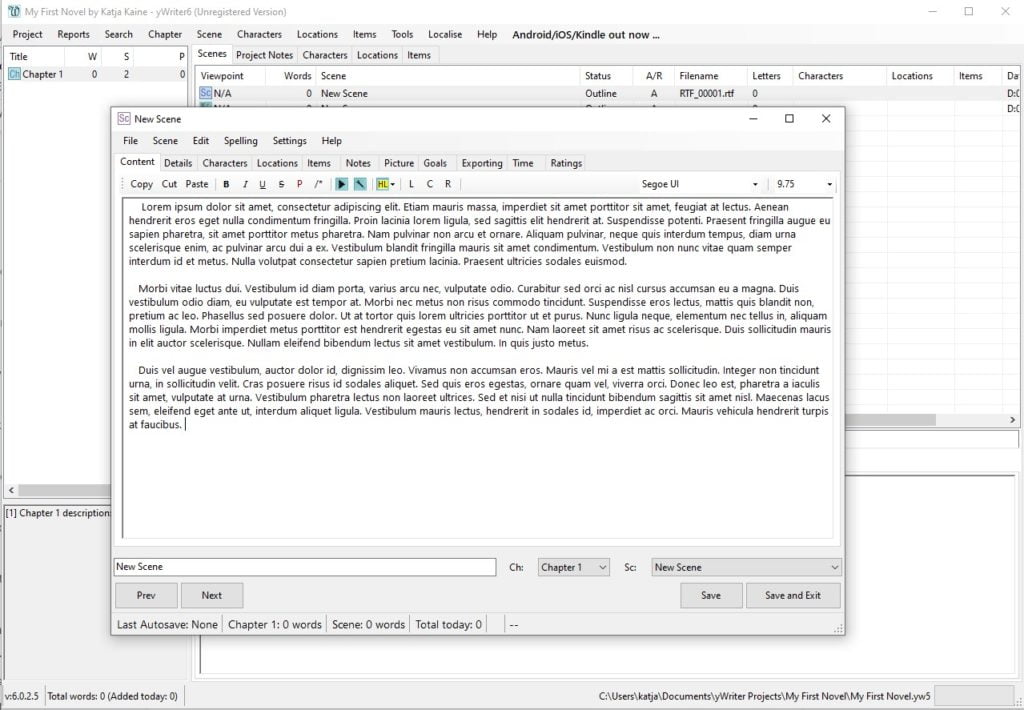
YWriter is another veteran piece of software which is widely respected and loved.
YWriter contains all the key features you’d expect from novel writing software, including clearly defined places to keep track of your characters, locations, scenes, chapters and somewhere to write your novel.
A big strength is that it allows you to link everything together and handily cross-reference, and it has lots of tools to keep track of your word counts and progress.
The main weakness of yWriter is that it’s not clear where to start when you first open it, and the word processor takes a while to find. Also, some sections of the interface are a bit primitive, requiring you to enter code syntax, rather than offering a proper graphic user interface where you can simply, click, drag and drop.
The characters, locations and tools tabs are all fairly straightforward, but the interface is all table-based, which can get a bit monotonous. While you can add images to characters, locations and items, they’re not displayed in the main interface for quick reference.
Like Scrivener, it doesn’t give you any guidance on how to actually write a novel.
Is yWriter the best free novel writing software for me?
While yWriter isn’t the most intuitive software to use, or the most fully featured, it has one major advantage which, for many writers, will rocket it above all the competitors.
That is that it is completely free.
For a free product, yWriter is quite phenomenal and it is extremely generous of the developer to give away such a great app with no charge at all. Of course, you can donate to help support future development, but even the suggested donations are only up to $24.95 as a one off.
So if you are looking for dedicated software to keep track of the key aspects of your novel but you’re on a tight budget, then yWriter is a fantastic option.
Click here to find out more about yWriter.
Fictionary
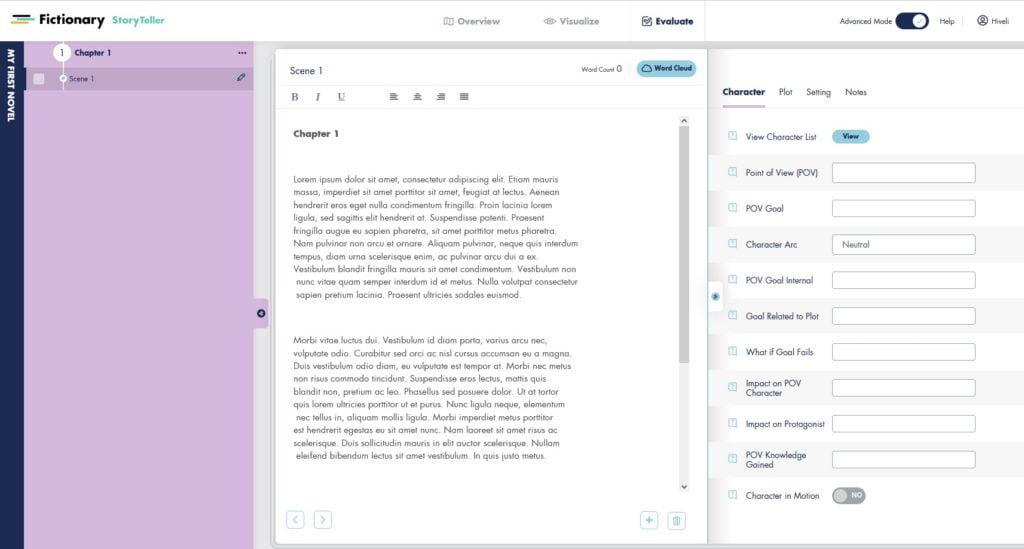
Fictionary is an online creative writing software that approaches the process from a different point of view. Instead of starting with an idea and helping the writer grow it into a full novel, Fictionary has a stronger focus on improving your manuscript after you’ve written it.
The main strength of Fictionary is its analytical capabilities once you import your manuscript. It can help you get an overarching view of your story arc.
It has an attractive interface and a sidebar with lots of useful prompts to help you think about various aspects of each scene.
The ‘Plot’ section of the sidebar gives useful prompts to encourage you to consider the type, role and goals of each scene.
Likewise, the ‘settings’ section offers useful prompts to help you think not only about the practical details of your setting, but also how it impacts the story.
The main weakness of Fictionary is that the data is only as good as what you enter, and the analysis relies a lot on your own understanding of story and character.
It offers a lot of numerical analysis and helps you identify tangible things such as chapters or scenes which are excessively long, or which contain excessive numbers of characters, but whether those things are actually an issue or not depends a lot on context and your own choices, and at the end of the day, the quality of a novel can’t be boiled down to statistics.
Also, everything is viewed by scenes, so you can’t get much of an overview of your plot, apart from the quite limited Story Arc.
Also, like Novlr, it doesn’t have much support for plot structure development or developing your characters, which isn’t that surprising, since its focus is on after you’ve written the novel. You can enter your characters, but the data is limited to name and whether that character is POV. You can’t add any further information, or images. You can add information about locations to each scene, but there’s no database of locations that stands alone.
It’s also the most expensive option on our list, at $20 per month or $200 per year.
Is Fictionary the best novel editing software for me?
Fictionary is useful if you’ve already written a manuscript and you want to analyse it to find out where the inconsistencies or weak areas are.
It’s great if you love obsessing over data, and it can help you think about aspects of scenes to make them stronger and more compelling.
It’s not very useful for new novelists who want to learn how to write their first novel, or for planners who are looking for tools to structure, outline and develop characters before writing their novel.
Click here to find out more about Fictionary and get a free trial.
Atticus
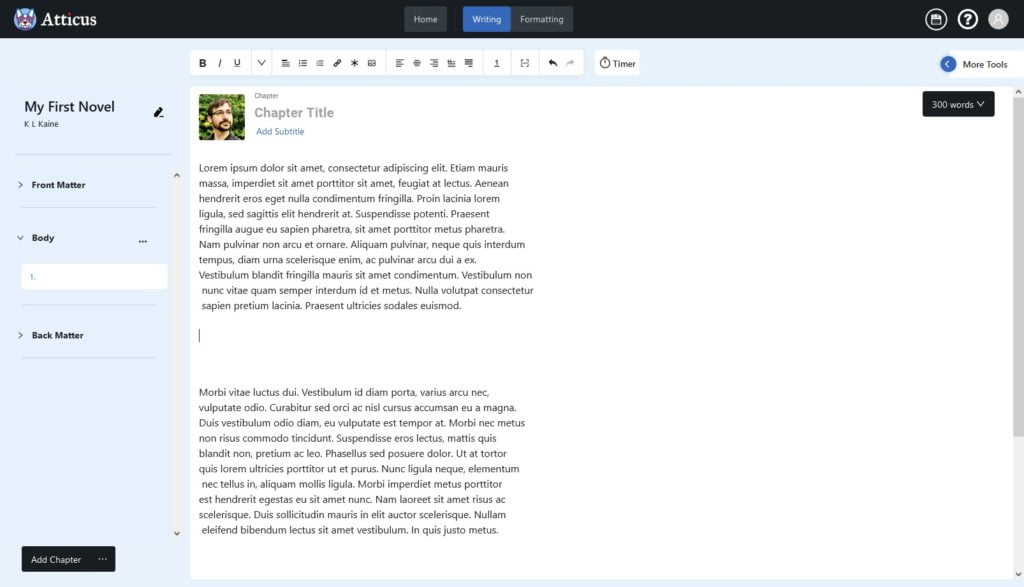
Atticus is a newcomer to the market, created by established self-publishing marketing guru, Dave Chesson.
The key unique strength of Atticus is its formatting and publishing functions. As a self-published author, Dave rightly recognised that there were few options on the market that allowed you to easily ready your manuscript for self-publishing – and even fewer if you weren’t on a Mac.
Atticus allows you to easily select between various formatting styles, and export your novel to a ready-to-go ebook format for all the major self-publishing platforms.
In conjunction with that, Atticus includes dedicated spaces for front matter and back matter, and it allows you to set writing goals, and even select which days of the week you plan to write, which is a nice touch.
It works in a browser, and you can also download apps for Windows and Mac, making it one of the most cross-platform options out there.
It’s got a slick, attractive, highly intuitive interface. It even features a cute cartoon dog – what’s not to like?
The weakness of Atticus compared to other novel writing software, is that it doesn’t offer any areas for keeping track of characters or locations, managing your plot. Of course if you don’t need those features, then that’s not a problem at all.
It also doesn’t get into the business of teaching you how to write a novel, so if you’re a beginner looking for more craft guidance, you’ll need to find that info somewhere else.
It doesn’t offer any free trial, which could be quite off-putting to some people, and the price isn’t that cheap, at $147, though that is a one-off cost. Asking people to pay that much without having been able to poke at the software first demands quite a lot of trust, though there is a no-quibble 30 day money back guarantee.
Is Atticus the best novel formatting software for me?
Atticus is almost certainly the best option for actively self-publishing authors who have a reasonable budget available and prefer to just get on with writing their novels without doing a lot of additional work creating character profiles, locations sheets or planning documents.
It offers a clean interface for writing, and easy formatting and publishing to all the major platforms, something very few of the other options offer.
On the other hand, if you’re looking for more comprehensive novel writing software which includes features and functions to help you keep track of characters, manage your plot and subplots and give novel writing advice, then Atticus is not that sort of one-stop-shop.
Click here to check out Atticus.
Write It Now
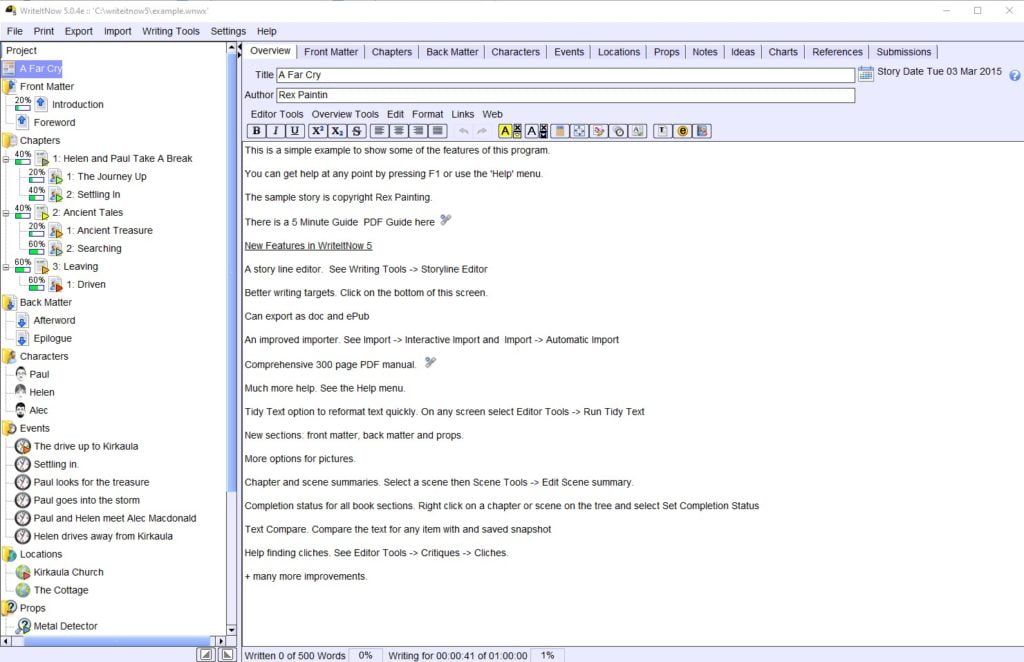
Write it Now is a desktop based novel writing software app available for both Windows and Mac, with a wide range of features, but quite a cluttered, dated interface.
The main strength of Write It Now is the wide range of features it includes.
As well as having sections to keep your characters, locations, events, props, notes and research, it has some cool tools which are rare in other programs, such as character relationship charts.
There are some prompts and guidance with regards to characters, such as including their birth and death date, and their relationship to other characters, but ‘personality’ is limited to sliders on different personality traits, such as ‘health’ or ‘aggression’.
Another strength is that it includes places for front and back matter, and offers a wide range of export options.
By far the biggest weakness of the software is its interface. Balance, style and consistency are lacking and it’s cluttered with fussy icons. And while at the top level the sections are quite intuitive, many of the buttons within the sections are quite confusing and it’s unclear what the intent behind them is, even after you’ve clicked them.
Finally, it doesn’t appear to offer many overview options, so apart from the tree list on the left hand side, you can’t view all of your characters at a glance. There also doesn’t seem to be a way to get an overview of your plot structure.
Is Write It Now the best novel planning software for me?
Write It Now is good for writers who are comfortable with technology and like to have lots of detailed features and functions, and who want to be able to drill down into lots of detail, and customise the software to suit themselves. And who aren’t that fussed about aesthetics.
It’s also a good option for users who prefer Desktop software, as many of the novel writing apps out there now are solely web-based.
It’s not good for people who value an aesthetically pleasing, intuitive interface. It’s also not good for people who want to keep things simple.
It doesn’t include any guidance on how to write a novel, so it’s less useful for new novel writers.
Click here to check out Write It Now.
FocusWriter
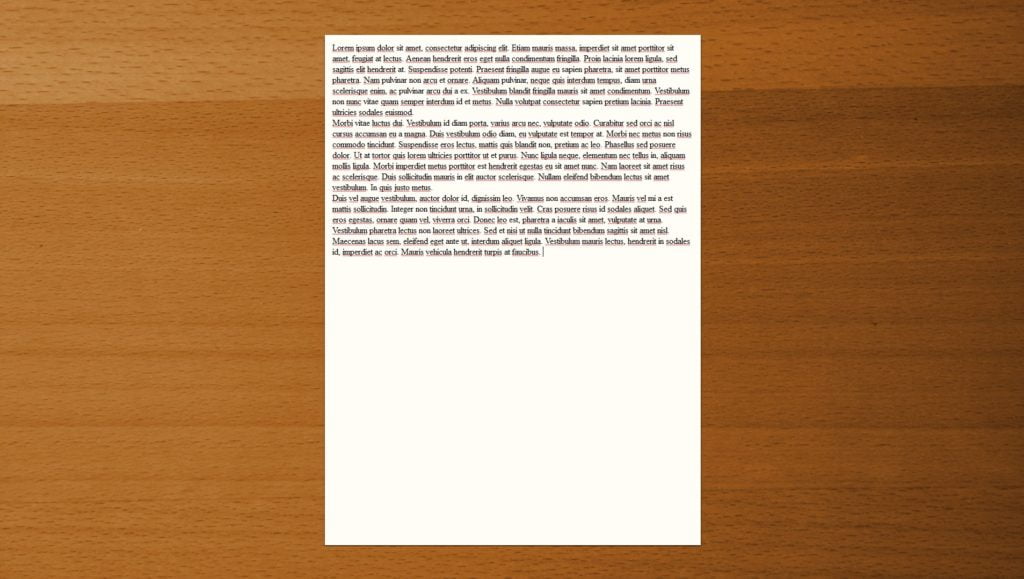
FocusWriter is a super-simple, free app to help writers focus and avoid distractions.
It’s biggest strength is exactly what it says – its focus. Its main objective is to minimise distractions, so you can get on with writing your novel.
It also has some customisation options, so you can change the background image to something you like and it’s available in multiple languages.
Its weakness is that it doesn’t offer anything else.
There is nowhere to keep track of any supporting information, such as that of characters, locations, items, research or notes. Of course, it doesn’t intend to offer those things, but if you want them – that’s a problem.
There’s no support on how to write a novel, and despite its simplicity, the interface still manages to look slightly dated.
Is FocusWriter the best novel writing software for me?
FocusWriter is perfect for authors who just want to get on and write a manuscript and not faff around with lots of planning and research. So it’s far better suited to discovery writers, rather than planners.
People who like to have a completely clear desk, and who find clutter impacts on their train of thought, will find FocusWriter the perfect solution.
If you’re looking for a more fully featured program, which will help keep track of supporting information, as well as the manuscript itself, then this is not the app for you.
Likewise, if you’re a new writer who wants a program that integrates guidance, templates and novel writing advice, then this is not a good option.
Click here to download FocusWriter.
Bibisco
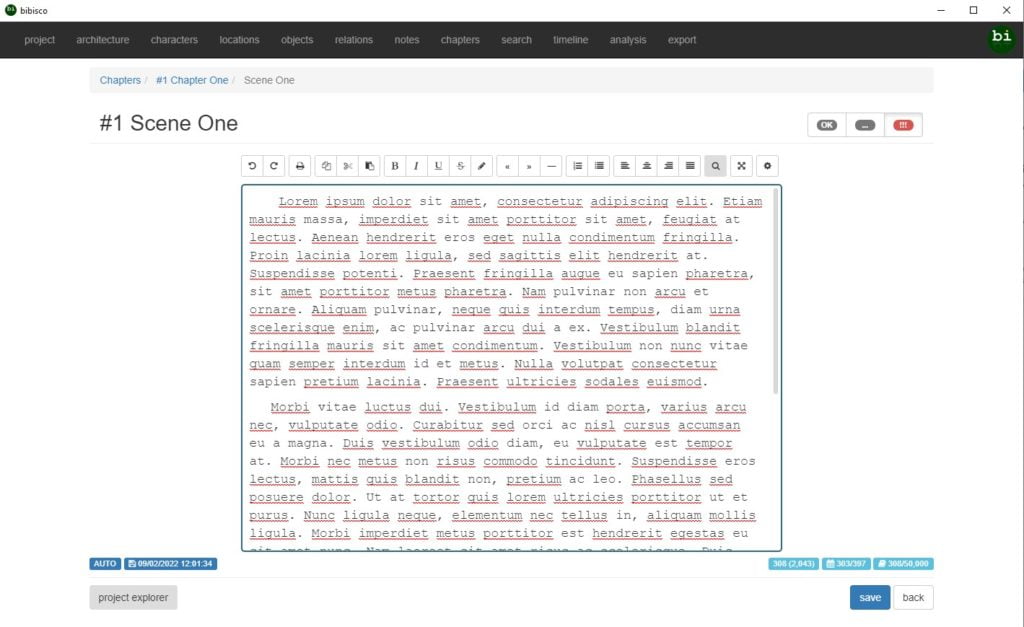
Bibisco is a desktop based app with a clean, uncluttered layout and a good range of features.
It’s main strengths are the simplicity of its interface and the fact it has sections for all the major aspects of novel writing.
It’s nicely laid out, with the option to add images to things such as characters and locations. It has graphs to visualise things such as chapter lengths and character and object distribution. Another great feature is the character relationships tool.
It includes quite a few character development prompts, though how you fill them in is a little confusing at first, and it’s not possible to easily see all the information at a glance, you have to keep clicking to drill down, and then clicking to go back up to the top level again.
Another nice touch is the popup help boxes that appear as you move through the app, giving you extra hints and tips without making you grind to a halt to complete a lengthy tutorial.
The biggest weaknesses of the software are the fact that it has no free trial, and the lack of clear flow of overarching structure to the software.
This is one of the only programs that doesn’t offer a free trial. The price is very low (only $18, though you can pay more if you feel inclined to), so you could just take a punt on it, but it seems a big ask to require people to fork out before they’ve ever had a chance to take it for a test drive and see if it suits them.
The other issue is that it’s not always clear the best way to use the software. For many this is fine, as they’ll use it how they please – but if you’re looking for something that will guide you through the novel writing process, you’ll be disappointed.
Is Bibisco the best novel writing software for me?
If you’re looking for a low-cost desktop app to keep track of key information relating to your novel, then Bibisco is a great choice. It has a nice clean interface, contains all the key sections you could require with a few nice extras, and is very modestly priced.
However, if you’re a discovery writer who just wants to get writing, it’s unlikely to suit you, as the emphasis is on supporting data, rather than the manuscript. It actually takes a while to find the word processor.
And if you’re a planner looking for a way to shuffle around plot points and get a bird’s eye view of your structure, Bibisco doesn’t provide that.
It also isn’t designed for new writers who are looking for guidance on how to actually write their novel, as it doesn’t contain that sort of information.
Click here to find out more about Bibisco.
Wavemaker
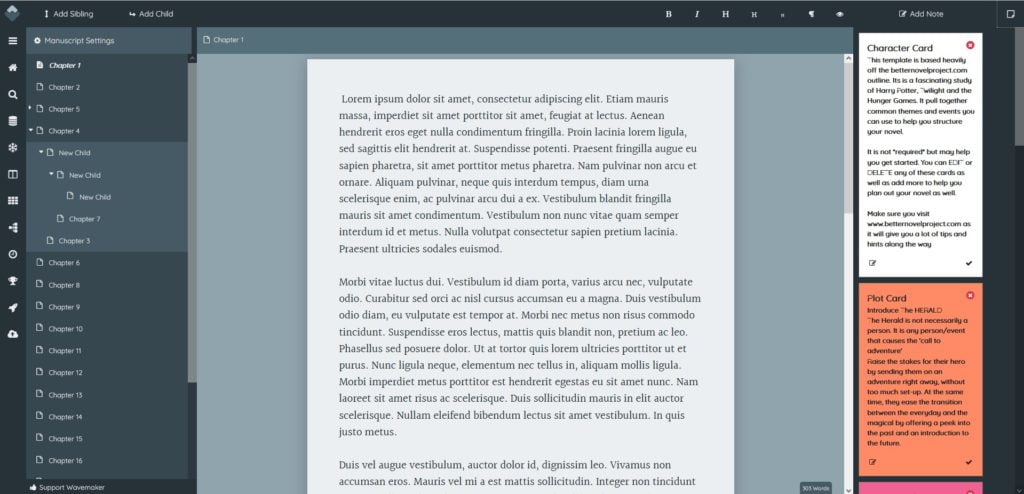
Wavemaker is a smart novel writing app which contains a range of useful features for novelists.
Like yWriter, it is a labour of love by a single developer who wanted to create software for his own writing, and like yWriter it is also available for free, with a gentle encouragement for you to donate money so he can spend more time on it.
It’s a progressive web app, which means it runs in a browser, but continues to work if you go offline, syncing as soon as it gets a connection back.
Our favourite Wavemaker strengths are its range of elegant planning features and its beautiful interface.
Wavemaker contains several different ways to plan your novel and gather your notes, each slightly different to take into account different ways of processing information, but allowing you to drag and drop items, and link ideas and notes in different ways.
It includes tagging, which can be very useful for cross-referencing and sorting, and it has a sidebar so you can view some of your notes while writing your manuscript.
It is very clean and pleasing to look at, and using the tools is very intuitive.
The main weakness of Wavemaker is that while it is a great selection of tools, they don’t integrate in any coherent way. You can’t enter info in one and then view it in one of the other sections to get a different perspective. There’s no flow, where you start in one section, then when that’s complete, move to the next. Then again, the freeform way will work better for many people.
Also, the tools mostly stop at the top level functionality, so they do what they say, but there’s not a lot more below the surface.
It doesn’t have any novel writing teaching resources, so people who are looking to write their first novel will need to find that information somewhere else, and there’s little in the way of prompts, to show you how to develop characters or settings, or structure a plot.
Is Wavemaker the best free novel writing software for me?
Wavemaker is great if you want a flexible, intuitive and aesthetically pleasing toolbox for working out the plot of your novel.
It will also be good for discovery writers who want a clean interface which works online and offline.
It’s less useful for new writers who are looking for writing craft guidance, or for those who like to see how all their data links together across the different sections.
Click here to check out Wavemaker.
Novlr
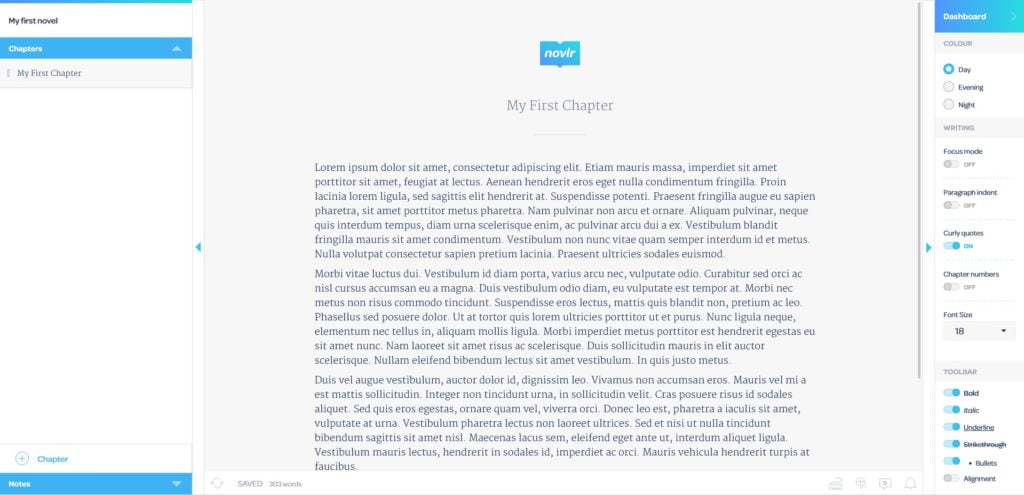
Novlr is a web-based novel writing app with a beautiful interface, a bunch of great features and plenty of resources to help teach you how to write a novel.
One of the biggest strengths of Novlr is how attractive and pleasing it is to look at, with its slick layout. For some people, this may be considered unimportant compared to the features available, but for many of us a clear, uncluttered interface helps our thoughts flow more clearly.
It also offers spelling and grammar suggestions, in the same way Word does, which not many novel writing apps do.
It autosaves and creates a version history, which gives great peace of mind.
It includes word count info and even motivational messages when you achieve your goals.
One of its weaknesses is the price – it is among the higher priced apps at $100 per year.
Another potential weakness (though could be a strength, depending on your point of view), is that it doesn’t have any features relating to characters, plotting or locations. The focus of Novlr is solely on the manuscript, so any related research or development you want to do has to be done elsewhere.
Is Novlr the right story writing software for me?
Novlr is perfect for discovery writers (also known as pantsers), with its beautiful, clean interface, proofreading tools and version history.
It’s also good for new writers as, like the Novel Factory, it has an integrated course to help you write your novel.
It’s not so useful for writers who are looking for a more all round software, which will give them somewhere to keep track of their cast of characters, offer plotting tools and world building resources.
Click here to find out more about Novlr and get a free trial.
In summary – what is the best novel writing software for you? Our top three recommendations, for planners, pantsers, and those on a budget.
As we’ve seen, if you’re looking for novel writing software, you’re spoiled for choice. You can find software that will take care of all your supporting novel data, such as characters and locations, or you can find absolute minimalist apps to help you avoid distractions.
There is software that teaches you how to write a novel, and there’s software that gives you imaginative ways to view your data, such as index cards, mind maps and relationship charts.
Some of the software is perfect for discovery writers, while others are a dream come true for planners. You may also want to consider using Papertyper, a free AI essay writer tool that can help you organize your thoughts and ideas. This is also worth your attention.
Some are aesthetically pleasing and calming to look at and use, while others prioritise highly customisable detail.
The right software for you will depend on your personal preferences and priorities, but here’s a summary of our top three favourites, for the most diverse requirements:
Here are our top recommendations:
- Best all round novel writing software: The Novel Factory
- Best minimalist writing software: FocusWriter
- Best free novel writing software: Wavemaker
Whatever your needs, we hope you find the tool that’s a perfect partner for your novel writing future!
Unlock your writing potential
If you liked this article by the Novel Factory, then why not try the Novel Factory app for writers?
It includes:
- Plot Templates
- Character Questionnaires
- Writing Guides
- Drag & Drop Plotting Tools
- World Building resources
- Much, much more
